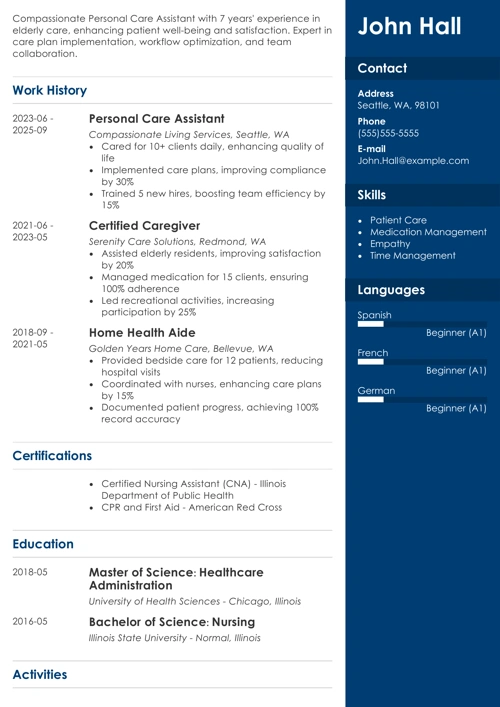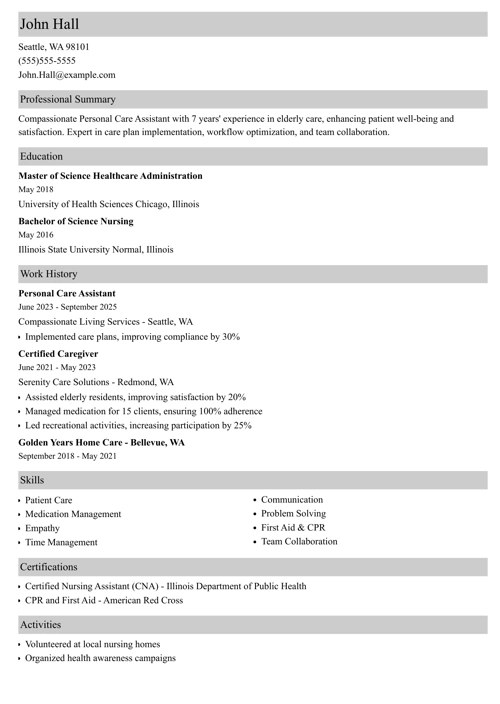Hiring managers look for people who can do the job and work as a team. To prove the latter, you need to present relevant soft skills, as they determine your emotional intelligence and attitude toward people.
What are they exactly, and how to put them on a resume? Read on, and you'll find out.
This article will show you:
- What soft skills are and why they’re in high demand at work.
- Lists of top soft skills divided into easy-to-understand subsets with explanations.
- How to identify your top soft skills for your resume and how to list them there.
Want to save time and have your resume ready in 5 minutes? Try our AI resume builder. It’s fast and easy to use. Plus, you’ll get ready-made content to add with one click. See 20+ resume templates and create your resume here.
Sample resume made with our builder—See more resume samples here.
After reviewing 11 million resumes created with our builder, we’ve collected valuable insights from users spanning different industries and levels of experience. Here are the top takeaways to help you design a more effective resume:
Data-Backed Insights From Actual Resumes
- 57.84% of resumes made with our builder are over 300 words, 28.23% are between 101 and 300 words, and 5.35% are under 100 words.
- 3.59% of our users have no work experience, while 28.86% report having less than 3 years of experience.
- Resumes typically list an average of 12.56 skills.
- On average, resumes include 2.61 previous jobs.
Looking for information on other types of skills? We’ve got you covered:
- Analytical Skills
- Computer Skills
- Management Skills
- Marketing Skills
- Project Management Skills
- Technical Skills
1. What Are Soft Skills?
Soft skills are a mix of personal attributes that help you build relationships with people. Some of them are interpersonal skills, common sense, personality, emotional intelligence, and attitude toward others. They are essential for success in the workplace as they impact how we interact.
Soft skills either can’t be acquired or are notoriously hard to acquire through traditional education. They are, however, transferable. What does it mean?
In short, you have transferable skills regardless of your job. For example, if you’re a great communicator, you’ll remain one after changing jobs.
With the advent of hiring for attitude, employers focus on soft skills more than ever. Soft skills in the workplace are the driving force behind any company’s success. Thanks to soft skills, team members can effectively collaborate with each other and achieve synergistic results.
Truth is, you can teach people to use new software or perform specific job-specific tasks relatively quickly. But you can’t teach them common sense. Or change their character.
This is also how soft skills differ from hard skills.
Soft Skills vs. Hard Skills
Hard skills are teachable and testable. You can learn them on the job, at school, or through various courses and certifications.
Soft skills are your interpersonal skills (a.k.a. people skills), the bulk of which depends on your personality and the environment you grew up in.
You can't test whether or not people will get along with each other. They either will or won't.
Now, without further ado, let's see some great examples of soft skills you can use on your resume.
Pro Tip: Check out if your employability skills are up to par. Make every employer wants to fight for you!
You can show off your soft skills in a job interview right from the start. How? Learn how to tell the recruiter about yourself, and make a great first impression.
2. Soft Skills Examples
One of the most common misconceptions about soft skills is that they’re only useful for customer-facing positions. While it’s true that customer service jobs do require well-developed soft skills, almost any other position that involves contact with another human calls for similar skills too.
Since such skills encompass various abilities and qualities, it may be useful to have a list of soft skills that would help you identify which ones you already have, and which ones you need to work on.
First, see the most-in-demand soft skills list for resumes in nowadays:
- Problem-solving
- Time management
- Organization
- Communication
- Teamwork
- Interpersonal skills
- Critical thinking
- Conceptual skills
- Creative thinking
- Decision making
You can now use the lists below as a master list that’ll help you identify your best soft skills for a resume.
Problem-Solving Skills
If people had no problems, the existence of businesses would make no sense. Problem-solving skills, along with time-management and organizational skills could easily become the unofficial Holy Trinity of soft skills.
- Analyzing
- Benchmark development
- Brainstorming
- Drawing conclusions
- Experimenting
- Innovation
- Insight
- Project design
- Solution design
- Test development
- Troubleshooting
Time-Management Skills
Time management skills are crucial to working efficiently and effectively. Here’s a look at what this skill subset can refer to:
- Assessment and evaluation
- Delegation
- Goal setting
- Managing appointments
- Meeting deadlines
- Multitasking
- Prioritizing
- Resource management
- Scheduling
Organizational Skills
They say entropy is the natural state of things. This could be true, but only up to a point. The point at which your organizational skills come into play.
- Collaboration
- Delegation
- Mental organizational
- Physical organization skills
- Planning
- Prioritizing
- Time management
- Work-life balance
Communication Skills
Good communication skills are a vital subset of soft skills. Employers view them as essential value effective communicators able to express themselves clearly, and who listen to what others have to say.
- Active listening
- Body language
- Brevity
- Clear speech and writing
- Confidence
- Cross-cultural communication
- Friendliness
- Negotiating
- Nonverbal communication
- Openness
- Oral communication skills
- Presenting
- Public speaking
- Storytelling
- Written communication skills
Teamwork Skills
This subset is crucial to your success in the workplace. Strong teamwork skills, in combination with the other types of soft skills, turn you into an A-player.
- Communication
- Conflict resolution
- Decision-making
- Influencing
- Listening
- Organizational skills
- Persuasion
- Planning skills
- Problem-solving
- Rapport-building
- Reliability
- Respectfulness
- Tolerance
Interpersonal Skills
The most important subset of your soft skills comprises your people skills or interpersonal skills. These skills help you establish good relationships with your coworkers and others.
- Ability to work under pressure
- Adaptability
- Communication
- Conflict resolution
- Creativity
- Decision making
- Dependability
- Emotional intelligence
- Mediation
- Patience
- Problem-solving
- Relationship building
- Responsibility
- Self-motivation
- Teamwork/Collaboration
Critical-Thinking skills
Critical thinking skills, also referred to as common sense, allow you to take a step back and judge a situation from a distance. They’re indispensable skills in any kind of position.
- Analyzing
- Evaluating
- Explanation
- Inference
- Interpreting
- Open-mindedness
- Problem-solving
- Self-regulation
Conceptual Skills
With the help of conceptual skills you can visualize complex interdependencies, see the big picture, and find optimal solutions. These skills come in handy to people in managerial positions in particular.
- Abstract thinking
- Cognitive skills
- Contextualizing
- Creative thinking
- Critical thinking
- Decision making
- Innovating
- Logical thinking
- Motivating
- Organizational skills
- Presenting
- Problem-solving
Creative-Thinking Skills
Creative thinking skills include a wide array of soft skills and abilities that let you see ordinary things from an extraordinary perspective. They help you find innovative solutions to various problems.
- Active listening
- Artistic design
- Brainstorming
- Communication
- Creative writing
- Open-mindedness
- Problem-solving
Decision-Making Skills
This is a great subset of skills for project management. Decisions have to be made, and the biggest challenge is to keep your cool and make the best one. Here’s a list of different types of decision-making skills:
- Consensus decision-making
- Consumer decision making
- Data-driven decision-making
- Ethical decision making
- Rational decision
- Shared decision-making
- Team decision-making
The lists could go on almost indefinitely. But you don’t have that much space on your resume, do you? So it’s crucial to know how to identify and present your top strengths on your resume.
Well, you're about to find out in the next section.
Writing a resume requires you to pay attention to many things big and small. Don’t let anything slip your attention, read our guide on what to put on a resume.
That was a long list of skills. But which ones are the most popular? We analyzed 11 million resumes made with Zety, and here are the top 10 most frequently added soft skills:
- Teamwork and Collaboration
- Problem-solving
- Time Management
- Excellent Communication
- Decision-making
- Multitasking
- Attention to Detail
- Adaptability and Flexibility
- Active Listening
- Relationship Building
Making a resume with our builder is incredibly simple. Follow our step-by-step guide, use ready-made content tailored to your job and have a resume ready in minutes.
When you’re done, our AI resume builder will score your resume and our resume checker will show you exactly how to improve it.
3. How to List Soft Skills on a Resume
Now that you know what soft skills are, it’s time to see which of them to put on your resume. Different positions have different requirements, so the skills you’ll want to put on your resume will vary from one position to another.
This is exactly why it’s crucial to tailor your resume to the position you’re pursuing.
Here’s how to choose the best soft skills for a resume in six simple steps:
1. Identify What Soft Skills Employers Are Looking For
It’s easy to do this. All you need to do is take a long hard look at the job offer they posted, and note down all the skills the employer looks for.
2. Make a Master List of All Your Soft Skills
You’re free to use the lists above to get inspired. Peek into our detailed guide on resume skills to identify the ones you have.
3. Compare Your List of Soft Skills to the Job Ad
This is how you can identify the right soft skills to put on your resume. Remember: focus on the ones you’re great at. Leave out all the rest.
4. Use the Resume Experience Section to Show Your Soft Skills
The trick is to work them into your resume experience bullet points. They’ll look much more powerful if you find a way to quantify them.
Job Description on a Resume—Soft Skills
- Effectively communicated the scope, schedule, and budget of projects to 10+ customers and contractors.
- Led a team of 5 sales representatives and mentored 20+ new hires.
Always try to quantify your experience described in bullet points. This way you show your real-life impact and turn your boring responsibilities into full-blown achievements for a resume.
Pro Tip: If you want to double the impact of every bullet point in your resume job description, start each one with a powerful resume action word.
5. Put Your Soft Skills in Your Resume Profile
Show off your skills at the top of your resume. Put some in your career objective or resume summary statement.
Soft Skills—Resume Objective Example
Collaborative and dynamic business analyst with 7+ years of professional experience. Eager to support XYZ Inc. with top problem-solving and analytical skills to support the company’s strategic initiatives. In previous roles increased sales by 20% by identifying a major bottleneck and improving business processes.
Pro Tip: See if the job offer identifies the character traits the employer desires. Have them? Great! Put them here. Your resume profile is a great place for resume keywords.
6. List Your Soft Skills In a Dedicated Skills Section
You can give more prominence to your top skills by putting them in a separate resume section labeled Skills.
Resume Soft Skills Examples
- Adaptability
- Collaboration
- Communication
- Organization
- Problem-solving
- Time management
Pro Tip: To make sure your resume goes past the ATS scan, use wording that mimics the job ad. For example, if the job ad lists collaboration rather than teamwork, go for collaboration.
7. Highlight Your Soft Skills in a Cover Letter
Your resume is not the only place where you should present your soft skills. To make your job application more effective, don’t forgo attaching a short cover letter. Use it as a chance to prove that you have some of the soft skills employers are looking for.
You can do that by telling a story connected to your soft skills using the STAR method:
- Situation: describe a situation or a problem.
- Task: mention what your role was.
- Action: describe what you did.
- Result: finish by presenting the effect.
A great cover letter that matches your resume will give you an advantage over other candidates. You can write it in our cover letter builder here. Here's what it may look like:
See more cover letter templates and start writing.
Key Takeaways
Here’s all you need to know about soft skills:
- In contrast to other types of skills, soft skills are hard to learn in a traditional way and are an integral part of your personality.
- The top soft skills that employers look for are problem-solving, teamwork, and communication skills, among others.
- Always highlight the right soft skills on your resume, and tailor your resume to the job offer.
- Don’t forget to mention your soft skills in a cover letter.
About Zety’s Editorial Process
This article has been reviewed by our editorial team to make sure it follows Zety's editorial guidelines. We’re committed to sharing our expertise and giving you trustworthy career advice tailored to your needs. High-quality content is what brings over 40 million readers to our site every year. But we don't stop there. Our team conducts original research to understand the job market better, and we pride ourselves on being quoted by top universities and prime media outlets from around the world.





